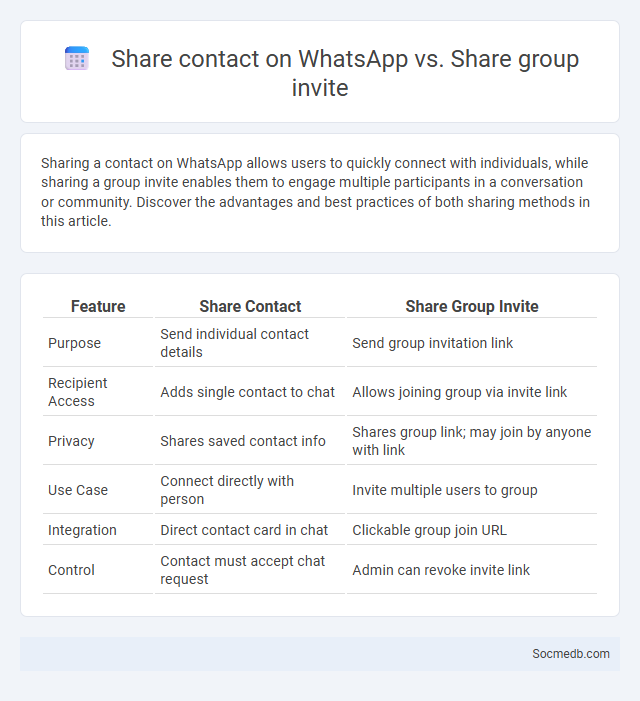
Photo illustration: Share contact to WhatsApp vs Share group invite
Sharing a contact on WhatsApp allows users to quickly connect with individuals, while sharing a group invite enables them to engage multiple participants in a conversation or community. Discover the advantages and best practices of both sharing methods in this article.
Table of Comparison
| Feature | Share Contact | Share Group Invite |
|---|---|---|
| Purpose | Send individual contact details | Send group invitation link |
| Recipient Access | Adds single contact to chat | Allows joining group via invite link |
| Privacy | Shares saved contact info | Shares group link; may join by anyone with link |
| Use Case | Connect directly with person | Invite multiple users to group |
| Integration | Direct contact card in chat | Clickable group join URL |
| Control | Contact must accept chat request | Admin can revoke invite link |
Introduction to WhatsApp Sharing Options
WhatsApp sharing options allow you to effortlessly send text, images, videos, and documents directly from your phone to contacts or groups, enhancing your communication experience. The app supports sharing files from other apps, including links and multimedia, with customizable privacy settings to control who sees your shared content. Leveraging these features, your social interactions become faster and more personalized across various devices.
What is Share Contact to WhatsApp?
Share Contact to WhatsApp allows you to instantly send a person's contact details through the WhatsApp messaging platform, facilitating quick and efficient communication. This feature supports the transfer of phone numbers, names, and additional contact information directly within chats or groups. Using Share Contact to WhatsApp streamlines connecting with others, saving time and avoiding manual input errors when exchanging contacts.
Understanding WhatsApp Group Invite Sharing
WhatsApp group invite sharing enables users to distribute a unique invitation link that grants access to specific groups, streamlining member additions without manual entry of contacts. This feature enhances communication efficiency by allowing seamless integration of new participants across diverse networks. Proper management and awareness of invite link privacy settings are crucial to prevent unauthorized access and maintain group security.
The Basics of Contact Sharing on WhatsApp
Contact sharing on WhatsApp allows you to easily exchange phone numbers and profile details with your friends, family, or colleagues directly within chats. By using the built-in contact sharing feature, you can send a contact card that includes a person's name, phone number, and other saved information without manually typing the details. This streamlined process enhances your communication efficiency and helps you quickly connect with new or existing contacts.
Key Differences: Share Contact vs Group Invite vs Contact Sharing
Share Contact enables you to send individual contact information directly to another user, facilitating one-on-one connections within social media platforms. Group Invite allows you to invite multiple users simultaneously to join a group or community, promoting collective engagement and interaction. Contact Sharing differs by enabling seamless exchange of contact details within a network or group, ensuring wider distribution without the need for individual invitations.
Benefits of Sharing a Contact via WhatsApp
Sharing a contact via WhatsApp streamlines communication by instantly connecting you and your recipient without manually entering details. This method enhances networking efficiency, especially for business interactions, by reducing errors and saving time. Your contacts remain organized and accessible, encouraging seamless exchanges and fostering stronger personal or professional relationships.
Pros and Cons of Sharing WhatsApp Group Invites
Sharing WhatsApp group invites can enhance your connectivity by allowing quick access to communities and facilitating real-time communication with like-minded individuals. However, it may expose your contacts to privacy risks and unwanted spam, as group members can see each other's phone numbers and share content without restriction. Balancing the benefits of increased interaction and networking with potential security concerns is crucial for maintaining control over your digital environment.
Privacy and Security Implications
Social media platforms collect vast amounts of personal data, increasing risks of unauthorized access, identity theft, and targeted cyber-attacks. Users must manage privacy settings carefully to control data visibility and prevent information misuse by third parties. Advanced encryption and two-factor authentication offer essential security measures to protect user accounts from breaches.
Best Practices for Sharing on WhatsApp
Sharing on WhatsApp requires clear and concise messages tailored to your audience's interests and preferences. Use high-quality images or videos to enhance engagement, and respect privacy by avoiding spam or excessive messaging. Your content should include relevant links or calls-to-action to encourage interaction and foster meaningful conversations.
Choosing the Right Sharing Method on WhatsApp
Choosing the right sharing method on WhatsApp enhances message clarity and recipient engagement by selecting between text, images, videos, or document formats. Utilizing WhatsApp's built-in features like voice notes and stickers increases interactive communication tailored to the context of the shared content. Prioritizing encrypted and privacy-focused sharing options ensures secure data exchange consistent with WhatsApp's end-to-end encryption protocol.
 socmedb.com
socmedb.com